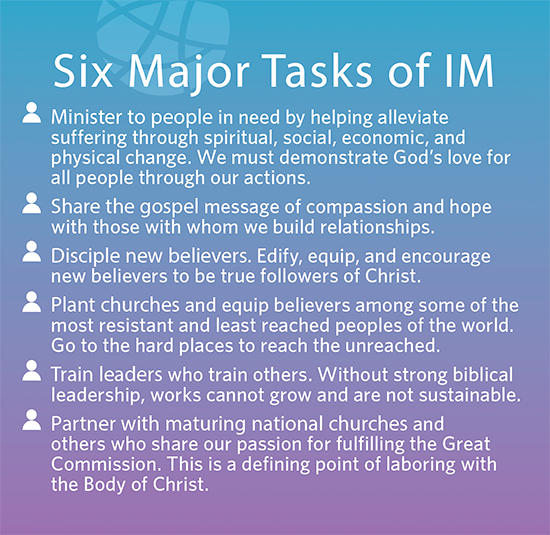
October-November 2022
Looking Back...
Looking Forward
------------------
|





Trends, Missions, and the Unchanging Gospel
By Clint Morgan
Trends are generally as unpredictable in their origination as in their lifespan. Sometimes, a world-wide event, such as COVID-19, kicks off a new trend. Within weeks or months, the entire globe was awash in the wake of this medical tsunami. Mission agencies and churches scrambled frantically to adjust to the constantly shifting goal posts of warnings, requirements, and restrictions.
Historically, world wars, natural disasters, economic crises, technological advancements, and generational shifts have served as impetus for major paradigm shifts. Influences of this magnitude often have long-term effects with little probability of a full return to preexisting patterns.
As unpredictable as trends may be, their life cycle must be monitored carefully if ministries are to survive and thrive in our ever-changing world. Some trends run their course over a short span of months; others may last several years.
Defining trends is almost as elusive as predicting them. Words like tendencies, inclinations, movements, fashion, style, vogue, and other ambiguous terms are often used to describe societal trends. However, I like the definition by Bob Houlihan, dean at Southeastern University in Lakeland, Florida: “A trend is a direction of movement. It’s the flow of a tendency which gives an idea where society or the Church is moving. Trends are like rivers that run where there is little resistance and after time, begin to shape the landscape. They run a course in a direction that is not a straight line.”
The world of missions is changing at a breathtaking pace. We must adjust to these trends affecting world outreach or become irrelevant and, ultimately, ineffective. To deal with movements and trends, we must practice contextualization. I define this practice as “adaptability without compromise.” We make the necessary adjustments, changes, or tweaks to stay relevant without ever compromising biblical principles. The world of missions is changing, but the message never changes. To survive the seismic cultural shifts and theological drifts we must make well-thought out, clearly-defined, Spirit-led adjustments.
Before we can adjust, we must identify trends. To conserve time and space, I will discuss just one missions trend we should recognize if we desire to thrive in the future. In the missiological world, the trend is known as polycentric expansion. It’s a fancy philosophical expression with a Bible-based foundation. Time and time again, Christ expressed His heart’s desire to see His disciples living in harmony (i.e., John 17). This trend builds on His desire for unity.
Two world trends, globalization and glocalization, have pushed mission agencies to deliberately move away from one center of power and oversight to a shared structure built around strong partnerships with other agencies of like mind. This shared responsibility and oversight leads to polycentric expansion. Simply, we work with others to expand God’s Kingdom.
In times past, denominational mission agencies functioned like an axle and spokes on a wheel. IM (or Foreign Missions as it was known) was the major cross-cultural sending agency for Free Will Baptists. Basically, Free Will Baptist missions work revolved around the functional effectiveness of the missions department. In the most practical sense, the agency was the focal point for
-
Vision casting
-
Promoting missions
-
Recruiting candidates
-
Vetting missionaries
-
Fundraising
-
Overseas church planting
-
Leadership training
-
Humanitarian work
In our ever-changing world, the decentralization of missionary efforts is imperative. IM still has oversight of its staff and is responsible for the functions listed above, but in a much different manner than in the past. Our present environment requires networking. We reach out to agencies and organizations that share our passion for the lost, commitment to Scripture, and dedication to working together to fulfill the Great Commission.
No singular agency can reach the world for Christ. No denomination can single-handedly take the gospel to every tribe and nation. God has ordained we work together within His Body to accomplish His plans. We are fully committed to working alongside those to whom God directs us.
Our mission statement declares we “labor with the Body of Christ to fulfill the Great Commission.”
By working with the Body of Christ, which certainly extends beyond our Free Will Baptist circle, we increase ministry potential. Other agencies develop their vision, oversee ministries, acquire resources, and manage personnel as independent agencies. However, in specified efforts, we join forces to accomplish more for His Kingdom. We collectively provide personnel, expertise, resources, or other essential elements to accomplish our communally agreed on goals and objectives.
In His infinite wisdom, God has allowed us to network with 27 agencies and several more are being vetted. Partnering with other evangelical agencies and individuals who share our passion for reaching the nations with the Good News honors God’s desire for unity within His Body.
Although we do not function the same way we did 75 years ago, we have not and will never compromise the Scriptures, lose sight of what we are about, nor compromise the integrity of the Free Will Baptist denomination. I want this concept clearly communicated. So, I reiterate, our IM mission statement is, “We exist to labor with the Body of Christ to fulfill the Great Commission.”
We ask our staff, both field and office, to know and embrace this statement. However, a mission statement accomplishes nothing within itself. Its realization is totally dependent on the actions and ministries of those working for and with IM.

To give guidance to the IM staff we developed six major tasks. If properly executed, these tasks lead to the accomplishment of the mission statement. Our partnerships exponentially expand opportunities to achieve these tasks. The subsequent examples reveal how this works.
1. Minister to people’s needs. One of our partners is opening new schools in creative access countries. This provides opportunities for trained schoolteachers and administrators to go into a challenging setting and share the gospel. IM has not set building schools as a strategic objective. However, we see the great advantage of speaking into children’s lives. Therefore, we are willing to come alongside this partner and provide resources when we can.
2. Share a message of compassion and hope with the lost. Recent partnerships with national churches in Bangladesh and Pakistan give us direct participation in the Word being preached in some of the most difficult places in the world. We can’t send missionaries into these closed areas, but we can provide leadership training via short visits as well as funds for building churches and evangelistic outreach.
3. Disciple every new convert. Many potential avenues are available in discipling new converts. Some common ones include Bible institutes, online courses, modular sessions, conferences, or other training programs. We work with pastors and leaders to develop and teach discipleship. We make short visits for intensive teaching. We work alongside national pastors, educators, and laymen to ensure all new converts are discipled.
4. Plant churches. Without the work of national pastors and church planters, our yearly statistics would be a fraction of what they are. All our missionaries are committed to seeing churches planted. Nevertheless, many national believers are passionate about seeing churches planted in their homelands.
A great example of this passion comes from a story Danny Gasperson, director of The Hanna Project, reported. He and Pastor Mike Trimble (Michigan) visited our partners in Bangladesh. They heard an amazing account of great suffering from a Bangladesh believer. She and her husband came to America and did well in business. Motivated by her love and commitment to believers in her country, she returned to her homeland to help build a church.
During the project, she was attacked by men who wanted to halt the church construction. They beat her and crushed her legs with a posthole digger. She was told the beatings would stop if the church building project stopped. She categorically refused. Eventually, they gave up. When healed enough to continue the work, she finished the church.
Overcome with emotion, Danny and Mike expressed how amazed they were at her strength and courage in the face of such pain and suffering. She simply replied, “Wouldn’t all Christians do that?” That is a question I honestly hope I never have to answer.
5. Train leaders for every congregation. Free Will Baptist Bible institutes in countries such as Cuba and Pakistan are devoted to training leaders for every new church. Our national church partners often sacrifice greatly to have such programs. Sometimes IM staffers get to be a part of the training programs. IM could never fill the need for leadership training for all our fields without direct help from the national churches. We need them, and they need us. Together, we can accomplish great things in the realm of leadership development.
6. Partner with the Body of Christ to continue reaching the lost. The International Fellowship of Free Will Baptists offers an opportunity for leaders from the various nations where we work to gather for fellowship and edification. What a great joy to see these brothers and sisters finding the sweet communion of interacting with fellow believers, even those from another language and culture! The leaders from the U.S. are not present to lord over our international brothers. We are equals, serving the Lord as one unit.
When you hear IM is developing a new partnership, know these partners are evangelical and have a Free Will Baptist connection. Some are led by Free Will Baptists who reach out to us, or us to them. We want to unite denominational missionary efforts. This does not mean the partner agencies are under the supervision of IM, but rather we truly labor together. I cannot help but believe God is pleased with seeing His people collectively pursue the expansion of His Kingdom.
Partnerships developed over the past year have opened doors of opportunity in three creative access countries, added to our member care efforts for our missionaries, and expanded our ministry options. We are literally experiencing polycentric expansion through faithful labor with our IM partners.
As Executive Secretary Eddie Moody often repeats with great conviction, “We are better together.” An African proverb puts it another way: sticks in a bundle are unbreakable. Let’s go forward together as an unbreakable force working with the partners God gives us so the world may know He has sent us.
About the Author: Clint Morgan is director of IM, inc. Learn more: iminc.org.
|
|

